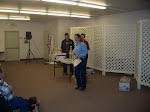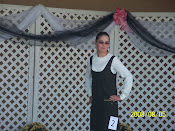We All Learn At a Different Pace
What did I learn about myself through my 4-H participation?
I learned that it is not easy to be 16 and on the edge of adulthood.
Head - to clear thinking, when giving your word to someone, think about how it will affect your heart if you buckle to peer pressure and go against your morals and ethics .
Heart - to greater loyalty; loyalty is something that is given freely and cannot be demanded or forced upon someone.
Hands - to larger service, you can only do what you feel is right and work hard to achieve your goals.
Health - to better living; if your word is your honor, and you stand fast to your morals and ethics; loyalty will come to you freely, your goals will be realized, and you will make a difference in the world around you.
I love 4-H !
Peer pressure is one of the hardest things we face; stay true to yourself no matter how hard it is and make a difference!
Farmer's Hands Video
Sunday, May 3, 2009
A Short 4-H Club History
At the same time, agricultural colleges and experiment stations were accumulating a body of scientific knowledge that would improve the farmer’s productivity and living standards. These professors began to consider the possibilities of indirectly reaching the farmers through teaching the farmer’s children improved agricultural methods.
The idea of starting 4-H clubs cannot be credited to one individual or institution. Instead, 4- H has resulted from many pioneer leaders. However, three people seem to have played a significant role in promoting this 4-H movement: W.B. Otwell, of Illinois, was an early (1900) sponsor of special farm work for youth. A.B. Graham introduced modern
4-H club organization and methods in Ohio in 1902. And in 1905 O.H. Benson, County
superintendent of schools in Wright County, Iowa worked out a plan of tying farm problems and record keeping in with school work.
The practice of having volunteers lead 4-H clubs was established at the beginning and continues today. Community members trusted these leaders to be good models for their children. Farm women and men, trained by county Extension agents, acted as volunteer leaders in the early clubs. Usually leaders assumed a mentoring role, rather than serving as an authoritarian figure.
Throughout history, camping held and important role in 4-H. Initially it was seen as a means of rewarding and encouraging junior leaders. Documentation dated 1907 tells of a camp for boys held that year in Missouri. Thereafter, several states began holding camps, with West Virginia leading the way in formalizing camping as a part of 4-H. By the1921, West Virginia had established a permanent campsite that is still used.
During World War II, the 4-H program again focused on raising Victory Gardens. 4-H member also grew essential war crops, raised neat animals, and canned millions of jars of fruit, vegetables, and meats. The 4-H slogan was “ Food for Freedom.”
Thus, 4-H members helped relieve the labor shortage, served as neighborhood leaders, and assisted in war related activities. It was estimated from 1943 until the end of the war, 4-H clubs produced enough food to feed a million men serving the American forces. At the end of the war, 4-H enrollment once again saw a large increase, reaching a total of 2.5 million. The performance, achievements and contributions of 4-H’ers during the war is quite possibly the proudest moment among many such moments in the history and development of the 4-H program.



























